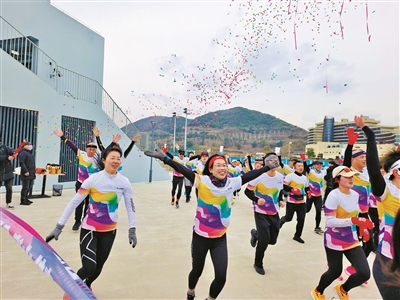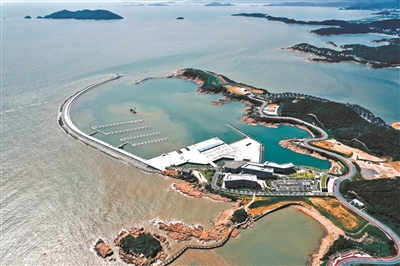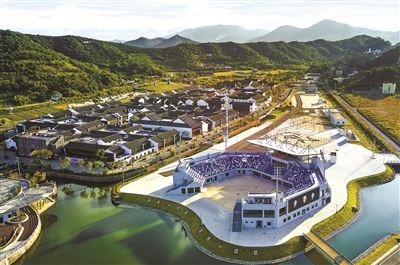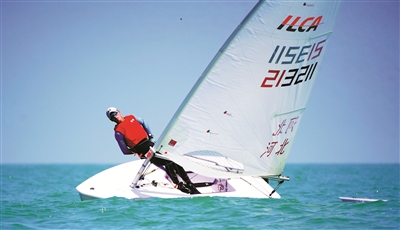
By Dong Na, Gou Wen, Xu Zhuowei
Chief Adviser: Zhou Fangzhou Proofreader: Xu Zhuowei
Photos by Xu Neng, Wang Ning
Venues in Xiangshan Make a Stunning Appearance
Recently, a number of watching spaces for the 19^th Asian Games have been officially unveiled in Xiangshan, providing citizens with a lively place to watch the Asian Games in the near future.
From the emblem "Tides Surging", the mascot "Congcong, Lianlian and Chenchen", to the core graphics theme "Heating the World", these Asian Games aesthetics with unique charm and characteristics are converging into one after another Asian Games landscape, making the appearance of "the most beautiful coastline at the 30 degrees north latitude" to a new level.
At the entrance passage of the Asian Games beach volleyball court, which is located on the Banbian Mountain of the East China Sea, the flags on the road painted with the colors and elements of the Asian Games fly in the wind. On the other side of the court, a group of mascots "Congcong, Lianlian and Chenchen" on the center of the installation welcomes every visitor. They stand out against the backdrop of blue sky and white clouds on the beach and waves.
"As required by the Asian Game Organizing Committee, the planning, design, and construction of the beach volleyball venues fully reflect the concepts of low-carbon, intelligent, frugal and civilized, and at the same time integrate the characteristics of Xiangshan's marine culture and diversified elements to present the science, technology, and eco-friendly features of the Asian Games. The investment reaches 125 million yuan." The person in charge of Ningbo Asian Games Organizing Team told reporters.

The beach of the competition court is made of more than 800 tons of soft fine sand, which has been strictly selected to avoid excessive dust and hidden dangers that may stab the skin.
It is worth noting that the beach volleyball court is the only competition event in the Ningbo competition area that can be seen by the spectators at the scene. The entire venue is built in accordance with the leading level in sand volleyball competition venues at home and abroad.
At the same time, the "Asian Games Bus" on the local bus route No. 104 has been off to the streets. The bus has spray-painted elements of the Asian Games, such as the slogan of the Hangzhou Asian Games and the mascot image, making it a beautiful scenery on the city streets.
The Xiangshan People's Square, covering an area of about 10 hectares, has been carefully built into a viewing space. The square is decorated with vivid mascot artistic shapes, and also contains modern Asian Games elements such as the emblem of the Asian Games.
A huge screen is also set up in the square. During the Asian Games, citizens can come here to watch the game. In addition, the Asian Games watching space in Xiangshan Fengqing Street has also been completed and opened. Next, Xiangshan will also complete other Asian Games watching facilities in the Tashan Park, Strait Square, and Damu Bay Greenland Asian Games theme park.
Xianshan also plans to use a variety of visual elements, such as Asian Games mascots and slogans, in urban landscapes, events, meetings, and public transportation.
‘Remote Sensing +AI’Helps Show the Spectacular Coastline

Recently, a dozen of cleaning staff, instructed by the local government, carried out a comprehensive cleaning of floating garbage objects on the seawall in Hengli Village, Xiangshan County. In an unusual move, the clean-up involved "black technology". Thanks to "remote sensing +AI", the coastline inspection in Xiangshan has gradually been digitally empowered, saving time, efforts and making the job more accurate.
In Xiangshan, the coastline stretches for 925 kilometers, about one eighth of Zhejiang's total. With the 19^th Asian Games approaching, as the venue for sailing and beach volleyball events, the hosts in Xiangshan are thinking about one question: how to present a perfect coastline to the people of the world? The answer is technology. Xiangshan uses high-resolution images from space and drones to monitor the coastline in a high frequency cycle, so that there are no dead spots in the restoration and protection of the coastline.
Last June, Xiangshan took the lead in the Zhejiang Province in making full use of satellite and UAV remote sensing technology to repair and protect marine ecology and resources. Due to the excessive length of the coastline, a huge total of human resources is required to maintain regular patrolling of the 118 beaches in Xiangshan, even at the minimum of five minutes a time, three times a month. Besides, many beaches cannot be reached by the staff.

Relying on a new generation of "black technology", such as remote sensing satellite data and AI algorithms, the monitoring of coastlines becomes automatic. The changes on the beaches are reflected in real time, including solid waste stacking, sewage discharge, shoreline encroachment, illegal construction, and illegal farming, among others. Such high-tech surveillance and alarming allow relevant departments to react in a timely manner. It only takes an average of two days a month to solve the problem that used to require thousands of people to patrol the beach.
"When we used satellite remote sensing for the first time in August last year, we found more than 80 problems and corrected them immediately." A Xiangshan County staff said that he was most impressed by the discovery of the construction waste pile in Yangbei Village. The "black technology" allowed it to be detected in time and cleaned with quickly.
In addition, Xiangshan County has a total of 33 scattered sewage outlets into the sea, and it was impossible to monitor them in real time previously. With the use of satellite remote sensing and AI, which made continuous monitoring possible, the local departments became capable of screening out suspected outlets that need targeted supervision. Hence, timely feedback to the inspection personnel at township and sub-district levels can be made.
"Using 'black technology' makes us more confident to serve the Asian Games." A staff member said that since the adoption of "black technology", in just seven months, more than 170 cases of solid waste stacking, irregular sewage discharge, shoreline encroachment, illegal construction, illegal breeding, among others were detected and solved in Xiangshan. The local government is confident that in the upcoming Asian Games, Xiangshan will show the world the most beautiful coastline at the 30 degrees north latitude.
Passing Down the Sportsmanship
Ningbo is home to nearly twenty Asian Games champions who defended national glory with sweat and achievements.
Ye Peisu, the two-time Asian Games champion, had been the leading role in women's all-around event for ten years in Asia. As early as 1971, her head and PE teacher Huang Mingchang had discovered the girl's talent.

"She was close to 1.70 meters as a freshwoman in the junior high school, which was extraordinary among girls," said Huang. And then, Ye was invited to join the school's track and field team.
Huang Mingchang found that Ye had good innate quality, but poor flexibility and insufficient strength. However, a girl from a rural household, Ye trained very hard to improve herself.
Once, the teacher asked her to press legs. At the lunchtime, the teacher went to the canteen for lunch and forgot about it. At that time, a classmate told the teacher that Ye was still pressing her legs. "This showed that Ye Peisu was very serious about her training," said Huang.
In December 1978, Ye Peisu participated in the eighth Asian Games held in Bangkok, Thailand. She won the champion in women's pentathlon with 4,133 points, exceeding the second place with more than 200 points, and qualified for the 1980 Moscow Olympic Games.
In 1982, the 9^th Asian Games was held in New Delhi, India. The women's pentathlon was upgraded to heptathlon, and Ye Peisu broke the Asian Games record again with 5,518 points. She became the first athlete in Zhejiang Province to win gold medal twice in a row in the Asian Games.
After Ye Peisu, a batch of Ningbo athletes boarded the Asian Games and won 34 gold medals, 13 silver medals and 11 bronze medals.
Wang Chengyi is one of them. In 2004, Wang Chengyi won bronze medal in Women's rifle 3x20 at the Athens Olympic Games. This was the first medal won by Ningbo shooters in the Olympic Games. After that, she won five gold medals in the 2006 Doha Asian Games and the 2010 Guangzhou Asian Games.
Now, as a shooting coach, she is more concentrated on the development of the sport in Ningbo. Her hometown is in Xiangshan, which is one of the divisions of 2022 Hangzhou Asia Games.
"I have full confidence in my hometown in hosting such a high-level event. I hope to create a stronger sports atmosphere and pass on the lifestyle of advocating health and loving sports to the whole Asia and even the world. I also hope to promote the sports industry, the economy as a whole, and the better looking of the city," said Wang.
Although she has retired as an athlete, Wang still wants to be part of the upcoming Asia Games. She said that the venues were built beautifully, and the surrounding roads, supporting facilities, and greening completed very well, and she was looking forward to going home to have a look.


